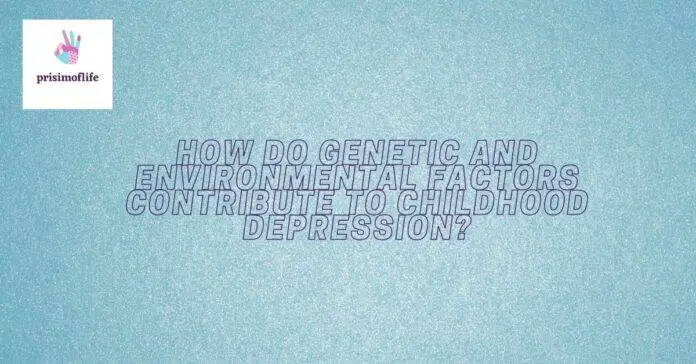
Have you ever wondered how do Genetic and Environmental Factors Contribute to Childhood Depression? If not, than this article is for you. Environmental factors such as harsh punishment, neglect, and bullying often contribute to the onset of the disorder.
However, the genetic components that contribute to this mental illness are complex and not yet fully understood. It’s likely that there are multiple genes and gene polymorphisms involved in the development of childhood depression.When combined with other factors such as brain damage or substance abuse, can lead to depressive symptoms in some children.
Important Facts
A lot of people think childhood depression is caused by a single event or factor. But, it’s actually caused by multiple events or factors.
Having more than one risk factor can increase your chances of developing depression in response to life stressors, but not all risk factors are equally powerful.
The risk factors for childhood depression are different for boys and girls, especially after puberty.
Genetics is only part of what causes childhood depression—the other part is life experience (or environment).
Environmental Causes
The traditional explanation for depression is that it is a chemical imbalance in your brain. This could be caused by genetics, trauma, drug abuse, or other mental illnesses. Research has shown that when parents are depressed, their children are more likely to be depressed at some point in their lives as well. Both of these could possibly be caused by genetic factors.
Knowing if you have a family history of depression can help diagnose depression early on and make treatment better overall. For example, being able to prevent your child from watching any traumatic events like wars or abuse might prevent childhood depression later on in life; however there is currently no way of testing for what those triggers are just yet.
Bipolar Disorder
Children diagnosed with bipolar disorder often face stigma. Bipolar disorder, also known as manic depression, is a mental health condition that causes extreme shifts in mood, energy, activity levels and ability to carry out day-to-day tasks. Children can have a hard time dealing with these extreme mood swings.
It is estimated that between 1% and 3% of children have bipolar disorder; however, it can take longer for them to be diagnosed than adults because there are not as many children’s health providers who are familiar with diagnosing bipolar disorder in young people. Kids who suffer from depression may believe they are simply having a bad day or down because of a change in schedule or school year rather than knowing it is something deeper like bipolar disorder.
Anxiety Disorders
Genetic, environmental, and neurobiological factors all play a role in anxiety disorders. There’s often some genetic predisposition toward developing an anxiety disorder, although it can also be acquired through life experiences. Neurobiological factors are usually evident as well. The chemical imbalances that develop within anxious people’s brains—including changes in dopamine levels, neural functioning, and hormone release—play a major role in causing or intensifying symptoms of anxiety.
When exposed to certain triggers or stressors, these imbalances may cause physical symptoms of anxiety (like increased heart rate) or emotional symptoms (like feelings of dread). Those with depression or bipolar disorder can also struggle with social anxiety because such disorders can interfere with one’s ability to relate normally to others.
Autism Spectrum Disorder (ASD)
ASD is a brain disorder that affects communication, social interaction, and behavior. These disorders typically begin in childhood. Currently, 1 out of 88 children are diagnosed with ASD. Studies have identified several factors that can contribute to ASD genetic factors, environmental agents (e.g., heavy metals), inflammation, or brain abnormalities.
One of these factors includes genetics. The risk for developing ASD may be elevated if there is a family history of ASD or intellectual disability (ID). However, having a sibling with an autism spectrum disorder does not necessarily mean that you will also have one as well.
See Also:










